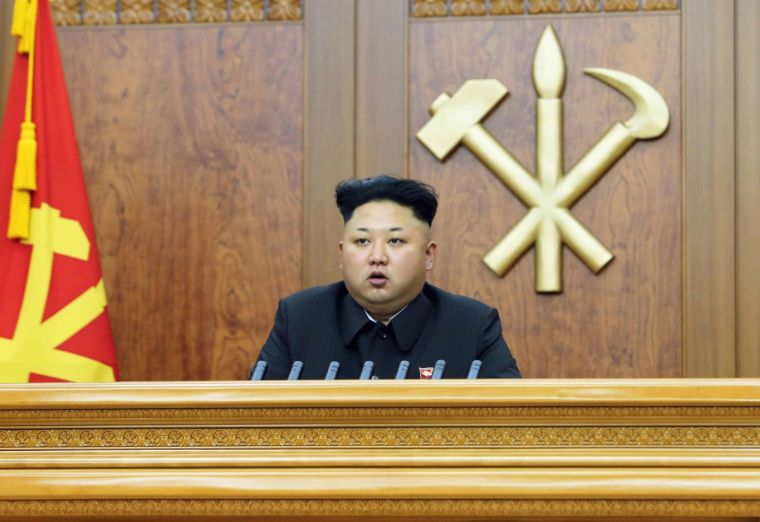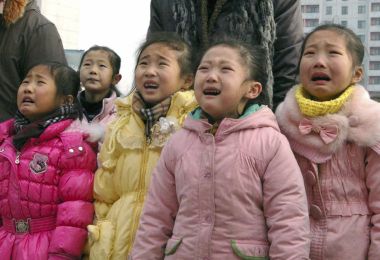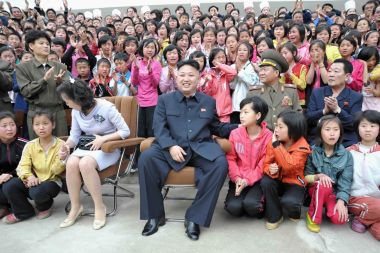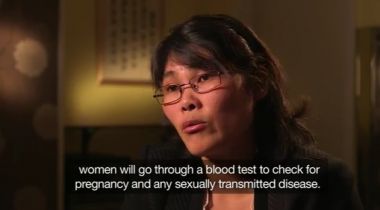Why North Korea is the most dangerous place in the world to be a Christian

For the 13th year in a row, North Korea has topped the annual World Watch List published each January by Open Doors, the organisation that campaigns for persecuted Christians.
Given the horrific images and stories we have become used to from Nigeria and the appalling events unfolding in Iraq and elsewhere in the Middle East, that's quite a claim. However, to anyone involved in monitoring human rights, it is uncontroversial. North Korea is not just the worst place in the world to be a Christian, it is one of the worst countries in the world to live, full stop.
This is in spite of the fact that to the uninitiated, North Korea can seem like a bit of a joke. It hits the headlines for the most bizarre of reasons. Last year, for instance, male university students were ordered to get their hair cut in the style of the "Dear Leader". (It is a sort of extreme pudding-basin cut, unflattering on anyone.) There were, quite rightly, howls of derision – but rather less reflection on what the decree said about the leader's personality cult and his ability to impose it on an entire nation.

More recently, North Korea has been accused of being behind the hacking of Sony Pictures emails in retaliation for The Interview, a spoof film about Kim Jong Un's fictional assassination. We all enjoyed the candid emails about Angelina Jolie, but it demonstrates the country's fearsome reach in cyber-warfare.
It is also a nuclear power with conventional forces which include an army that is the largest military organisation on earth. It has 9,495,000 active, reserve, and paramilitary personnel, representing 40 per cent of the entire population.
This wholesale militarisation of the country has been achieved through levels of state control and oppression which are unparalleled anywhere else. According to Amnesty International, "North Korea is in a category of its own when it comes to human rights violations. It is a totalitarian state where tens of thousands of people are enslaved and tortured. All forms of freedom of expression are repressed and anyone attempting to assert their rights is crushed. In North Korea, where failing to show sufficient reverence for the country's leaders is a serious offence, no one is safe from arrest and imprisonment."
The control exercised by the state has ensured the subjection of its people in the face of appalling hardships. A famine from 1994-98 killed hundreds of thousands of people: accurate data is impossible to come by and some estimates are as high as 3,500,000 out of a population of 22 million, though recent research suggests the range may be between 500,000 and 600,000.
A drought last year brought fresh suffering, with the United Nations estimating that around two-thirds of the population suffer chronic food shortages. In spite of recent economic growth, Generations of North Koreans have grown up malnourished, stunted and prone to diseases for which a healthcare system which is non-existent outside the main cities is unable to provide remedies. Punitive sanctions imposed by most of the world out of justifiable outrage at the excesses of the regime have failed to moderate the behaviour of its leaders and arguably contributed to the suffering of ordinary North Koreans, while they are circumvented by China, which is terrified of the instability that might result from the collapse of its armed and dangerous neighbour.
Twisted ideology
But what lies behind the regime's behaviour, and why does it target Christians?

Central to understanding the paranoia and secrecy of North Korea are the concepts of 'Juche', developed by the country's founding father Kim Il Sung, and the related 'Kimilsungism' named after him. Juche's three key principles are political independence, economic self-sufficiency and self-reliance in defence. However, in practice these have morphed into an ideology of obsessive secrecy, ultra-nationalism and an extraordinary cult of personality focused on the country's leader – Kim Il Sung and his successors. Such is the extent of this that a leader's death, for instance, can be the focus of intense emotion – and anyone who doesn't feel it or can't fake it is in trouble.
In her book Nothing To Envy: Ordinary Lives in North Korea, Barbara Demick wrote, referring to Kim Il-sung's death in 1994: "The histrionics of grief took on a competitive quality. Who could weep the loudest?"
She noted that one young student in Pyongyang felt nothing as all around him were wailing. However: "His entire future depended on his ability to cry. Not just his career and his membership in the Workers' Party, his very survival was at stake. It was a matter of life and death."
She wrote that he was saved by holding his eyelids open and his eyeballs exposed until they burned and began to tear up. Once they started, he began sobbing like everyone else.

Absolutely nothing can be allowed to challenge this cult – and certainly not Christianity, seen both as a foreign ideology and as a threat to the regime's absolutism. Total social control has been achieved through the 'Songbun' system in which people are divided into three main classes: the loyal, the wavering and the hostile. These are further divided into 51 subclasses. Christians are part of the 'hostile' class, with Protestant Christians being ranked at 37 and Catholic Christians at 39 – a long way down the pecking order.
Open Doors estimates that there are around 300,000 Christians in the country, though hard evidence is difficult to come by because of the regime's obsessive secrecy and total control of information – all newspapers are censored and only a tiny minority of trusted individuals have access to the internet. Believers meet largely in secret. The few churches allowed to operate are fronts put on for foreigners to able to demonstrate North Korea's 'freedoms' – though bizarrely, in 1992, Billy Graham visited the country at the invitation of the 'Eternal President' Kim Il-Sung and was allowed to give a speech in Pyongyang. He made a second trip in 1994.
Prison camps
Evangelism is absolutely prohibited and carried out at the risk of death or imprisonment in one of the country's fearsome labour camps. Last year it was reported in the South Korean press that 33 North Korean Christians faced execution after being charged with attempting to overthrow the regime – they had worked with South Korean Baptist missionary Kim Jung Wook and received money to set up 500 underground churches. While the story has been questioned, it is perfectly credible. And would-be Christian missionaries from outside the country such as Kenneth Bae and Jeffrey Fowle have found to their cost that North Korea does not tolerate religious interference.
Amnesty quotes one former inmate, Kim Young, who spent nine years in one of the prison camps. "It is a place that would make your hair stand on end," she said. "From sunrise to sunset, you work. You get up at 3.30 to report for work at 4.30." She also recollects pregnancy tests, forced abortions and deliberately induced miscarriages: "Pregnant women get sent to labour camps to carry loads up and down the hills which causes miscarriages."
A former prison official says: "You would need to walk 12-14 miles to get to the field where you plough. You would be expected to walk the distance and then plough the field. You would have to stay awake until midnight as well. There are meetings going until midnight."

Another woman Jihun Park, recalls: "Four women had to plough with an oxcart, two in front and two at the back, carrying a ton of soil in the cart. We couldn't do this at a walking pace either, we had to run."
According to a former military captain. "Starvation is the biggest problem. I saw piles of bodies who have died from starvation in public places."
Torture, executions – including the execution of children, especially after they have tried to run away – and sexual abuse are common. A former prison guard says: "After a night of 'servicing' the officials, the women had to die because the secret could not get out. This happens at most of the political prison camps.
A peculiar refinement of the system is the "guilt by association" principle, in which several generations of a family in which one person has transgressed are executed or sent to labour camps as well – ensuring that every member of a family is made responsible for keeping the others in line. (Current president Kim Jong Un is reported to have ordered the execution both of his uncle and his uncle's family in a purge last year.)
Around 100,000 people are thought to be held in these conditions.
Christian witness
Yet even so, the North Korean Church survives – even in the labour camps themselves. Open Doors tells the story of a woman called Chun, who was sent to one of North Korea's horrific labour camps after she tried to escape to China as punishment for 'defecting' (refugees who do reach China are often sent back). "I was beaten and tortured so badly that I could barely stand up," she says. However, in her dirty, overcrowded prison cell, she says: "There was one lady who was really kind to me. When I was in so much pain she invited me to lay my head in her lap. She stroked my hair.
"This lady came to faith when she was in China. She was put behind bars, just like me. It did not stop her from doing Christ's work." Some time later Chun herself became a believer. She says: "Despite all my suffering I love God with my whole heart. I am so grateful for Him."
Like many of the world's darkest places in the late 20th and 21st century, North Korea was a product of the rivalry between the USSR and the West. The mind of its founder Kim Il Sung was formed by the Marxism of his Soviet and Chinese mentors. However, the division of the Korean peninsula after the Korean War (1950-53) has allowed the North to calcify in a brutally oppressive oppression in which the minds, bodies and spirits of its citizens have been warped by a paranoid dictatorship which maintains its control through terror and indoctrination, uniting its people through fear of a common – imaginary – enemy.
Many of the old Cold War conflicts have been resolved. North Korea, where human suffering has nowhere been as great for so long, has not – and humanly speaking, there seems very little chance of change any time soon. UN Security Council resolutions, sanctions and even mass starvation have failed to shift the regime one iota.
It is always easier to pray for people when we know their stories and their faces. One of the problems faced by North Korean Christians is that they are usually anonymous. They have no internet; there are no pictures; there are no names. It is easier to concentrate on causes that are more media-friendly. But Jesus cared for the faceless and voiceless, too. In a world awash with information, the hidden horrors of North Korea need our prayers more than ever.
Follow @RevMarkWoods on Twitter.











